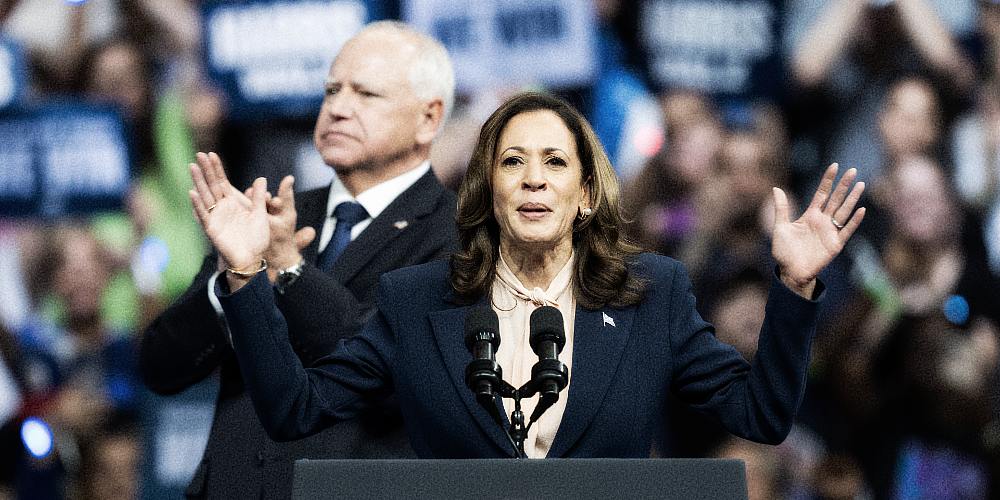(RealClearEnergy)—When I wrote last week on the clever (and misleading) statement from Vice President Harris linking the pursuit of diverse energy sources with freedom from foreign oil dependence, I suspected there was more to the story. I just hadn’t stumbled on the evidence—until I saw a headline referencing a recent study documented in a research article published by PNAS. For the uninitiated, PNAS is a well-known scientific journal trusted by many but not by all.
The title of the research article is: Effects of system-sanctioned framing on climate awareness and environmental action in the United States and beyond. Sounds pretty heady, I know. But I bought it and read it so you don’t have to.
The purpose of the study is to determine whether people are more likely to get on board with climate action if they are first exposed to “patriotic” and “system-sanctioned” messaging. My Spidey sense is already tingling, because there’s a hypothesis embedded in that purpose and it doesn’t feel right.
They didn’t go into the study wondering whether people might be influenced by some sort of messaging (that would sound like objective science). They began with a specific message—which means someone wanted to know whether that particular message would have the desired effect. That sounds like an agenda.
So let’s consider the inciting incident for such a story. The authors note that planetary concern alone has failed to inspire enough people to make the sacrifices needed to avert an alleged disaster. It seems many of us, like the poor R2 unit, have a bad motivator. So we need something else. Something more visceral. Something that really moves us.
That something, it turns out, is the status quo. Here in America we care deeply about preserving our way of life. And we should—it’s a good way. In fact, the authors suggest the status quo is what keeps many people from taking action. Their version of supposedly saving the planet requires changes that impact our way of life, and we naturally resist such changes—especially if we’re not convinced the cause is real. So someone hatched a plan to use our defense against us. And they tested their idea with this study.
Here’s how they did it. They presented participants with a series of statements and sentimental photos that connect environmental themes with happiness and life in America. It ends with Let’s keep the United States as it should be. Shrewd.
After looking at the “messaging,” the participants answered questions about the severity of climate change and what should be done about it—from raising taxes to government-mandated “sustainable” energy. The control group, who only read a random passage from Great Expectations, answered the same questions.
And now for the exciting conclusion:
In a large, nationally representative U.S. sample, we found that the system-sanctioned change intervention successfully increased liberal-leftists’ as well as conservative-rightists’ belief in climate change; support for pro-environmental policies; and willingness to share climate information on social media.
Sounds Orwellian? I thought so too.
It’s probably no coincidence this study was published on September 9 and the presidential debate was one day later. Kudos to the Harris team for picking it up and weaving it in so quickly—unless perhaps they had an advance copy, since it was accepted by PNAS in June.
There’s a lot I could say about the study itself and how the “messaging” is constructed using the principle rules of propaganda. But few of us are truly innocent of that charge, even for honorable purposes. Nonetheless, the mission for this sort of message is not to win on logical grounds. In the words of the research article:
We tested an experimental manipulation derived from system justification theory in which pro-environmental initiatives were framed as patriotic and necessary to maintain the American “way of life.”
From the text it is objectively clear that someone wants to manipulate us. Someone wants us to hear something that makes us go along with what they want.
If the intention were genuinely about protecting our way of life, then the environment is a consideration. But in today’s world the chief factor is affordable, reliable energy—without which everything stops. If we truly want to keep the United States as it should be, then it all starts with energy. And the only proven solution at this time comes from cheap, abundant oil and natural gas. We have plenty of that in America to maintain our way of life for a long time. At least until someone perfects dilithium crystals.
This allegedly scientific study is not about preserving our way of life. But it certainly provides a base from which to launch a barrage of new messaging.
Coming soon to a campaign near you.
Michael O’Sullivan is Program Director and COO for Blue Energy Nation, a non-profit committed to educating young people on energy realities. He is also a popular podcast host and an advocate for smart energy choices.
What Would You Do If Pharmacies Couldn’t Provide You With Crucial Medications or Antibiotics?
The medication supply chain from China and India is more fragile than ever since Covid. The US is not equipped to handle our pharmaceutical needs. We’ve already seen shortages with antibiotics and other medications in recent months and pharmaceutical challenges are becoming more frequent today.
Our partners at Jase Medical offer a simple solution for Americans to be prepared in case things go south. Their “Jase Case” gives Americans emergency antibiotics they can store away while their “Jase Daily” offers a wide array of prescription drugs to treat the ailments most common to Americans.
They do this through a process that embraces medical freedom. Their secure online form allows board-certified physicians to prescribe the needed drugs. They are then delivered directly to the customer from their pharmacy network. The physicians are available to answer treatment related questions.



